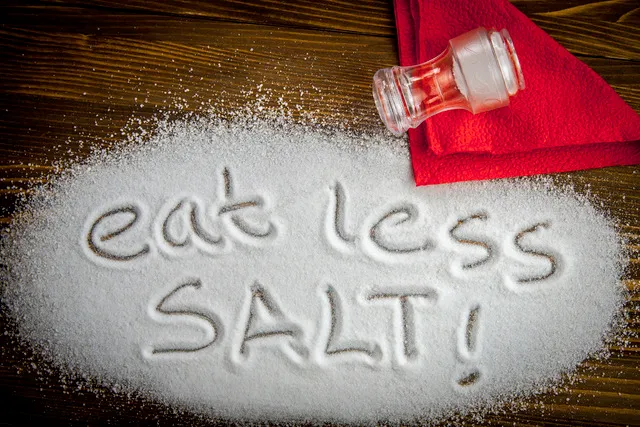Salt – the ultimate flavor enhancer or a silent killer? It’s a question that’s been debated for decades. I used to be convinced that sodium was the enemy, the villain lurking in every shaker and processed snack.
And yet, there I was, taking a closer look and starting to doubt the usual beliefs everyone clung onto. What I discovered shocked me.
Turns out, the story of sodium isn’t as simple as we’ve been led to believe. It’s not all doom and gloom, and cutting salt out completely might do more harm than good. Ready to have your mind blown?
Breaking it down – here’s what you need to know about sodium and staying healthy.
Debunking Sodium Myths
When it comes to sodium intake and its impact on health, there’s a lot of misinformation out there. It’s time to set the record straight and explore the essential role sodium plays in our bodies.
Sodium has gotten a bad rap over the years, but the truth is, it’s crucial for maintaining optimal health. Let’s dive into the misconceptions surrounding this misunderstood mineral.
The Essential Role of Sodium
Sodium is a vital electrolyte that our bodies need to function properly. It helps regulate fluid balance, transmit nerve impulses, and plays a key role in muscle contractions, including the beating of our hearts.
Without enough sodium, our bodies would struggle to maintain healthy blood pressure levels and keep our organs functioning optimally. So, while it’s important not to overdo it on the salt shaker, cutting out sodium entirely is not the answer.
The Misinterpreted Dash Sodium Study
You may have heard about the famous Dash Sodium Study, which suggested a link between high sodium intake and increased blood pressure. However, what often gets overlooked is that participants in the study also significantly reduced their sugar consumption.
This means that the lower blood pressure observed in the study could have been due to the decreased sugar intake, rather than the reduction in sodium alone. It’s important to look at the whole picture when interpreting scientific studies.
In fact, a recent study involving over 6,000 people found no strong evidence linking salt or sodium consumption to increased blood pressure. This highlights the need for a more nuanced understanding of how sodium affects our health.

Understanding Sodium’s Impact on Health
So, how exactly does sodium impact our health? Let’s take a closer look at the role it plays in our bodies and why it’s not the villain it’s often made out to be.
The Balance Between Sodium and Potassium
When it comes to maintaining healthy blood pressure levels, it’s not just about reducing sodium intake. It’s also crucial to ensure you’re getting enough potassium in your diet.
Potassium helps counteract the effects of sodium and keeps our bodies in balance. Foods like bananas, avocados, and leafy greens are excellent sources of potassium that can help keep your sodium levels in check.
Cravings and Fluid Retention
If you find yourself craving salty foods or experiencing fluid retention, it could be a sign that your body needs more sodium. However, it’s important to note that these cravings can also indicate a potassium deficiency.
When we don’t get enough potassium, our bodies may try to compensate by retaining more sodium. This can lead to bloating and swelling, especially in the hands and feet.
It’s also worth mentioning that drinking too much water without replenishing electrolytes like sodium can lead to a condition called hyponatremia.
This occurs when the sodium levels in your blood become too diluted, which can cause symptoms like headaches, nausea, and in severe cases, brain swelling and heart problems.
Making Informed Choices About Salt Intake
So, how can you make informed choices about your salt intake without compromising your health or taste buds? Here are some practical tips to keep in mind.
Junk Food, MSG, and Sugar’s Role
One of the biggest contributors to excessive sodium intake is processed and junk foods. These foods are often loaded with salt, MSG, and sugar, which can throw off the delicate balance of sodium and potassium in your body.
When you consume too much sugar, your body may excrete more potassium in an attempt to maintain balance. This can lead to a potassium deficiency, which in turn can cause your body to retain more sodium.
Choosing the Right Salt
When it comes to selecting salt, not all options are created equal. Refined table salt is heavily processed and stripped of its natural minerals, which can contribute to imbalances in the body.
Instead, opt for natural sea salt or pink Himalayan salt, which contain trace minerals that can help support overall health. These salts are less processed and provide a more balanced source of sodium.
It’s also important to be mindful of your overall sodium intake. The average person consumes around 3,400 milligrams of sodium per day, while potassium intake is often much lower at about 1,000 milligrams.
Aim to strike a balance by reducing processed foods and increasing your intake of potassium-rich whole foods.
By making informed choices about the types of salt you use and the balance of sodium and potassium in your diet, you can support your health without sacrificing flavor.

Salty Truths
Delve into the impact of sodium on health while uncovering what hot dogs are made of. Sodium, commonly found in table salt and processed foods, has been the subject of much debate regarding its effects on cardiovascular health and overall well-being.
This guide examines the role of sodium in the body and its potential health implications when consumed in excess. Additionally, it sheds light on the ingredients typically used in the production of hot dogs, which often include meat blends, additives, and preservatives.
By understanding the composition of hot dogs and the effects of sodium on health, individuals can make informed dietary choices to support their well-being.
Conclusion
So, is sodium bad for you? The answer isn’t a simple yes or no. While excessive sodium intake can contribute to health issues, cutting it out entirely isn’t the solution.
Think of sodium as the unsung hero that keeps your body’s fluid levels in check while also ensuring your muscles and nerves function smoothly.
The key is finding the right balance. Opting for whole, unprocessed foods, seasoning with pure sea salt in moderation, and ensuring adequate potassium intake can help you reap the benefits of sodium without the risks.
It’s time to shake off the fear and guilt surrounding salt. Knowing all this, selecting the right options for your personal wellness path is a breeze. So go ahead, enjoy that pinch of salt – your body will thank you for it.














